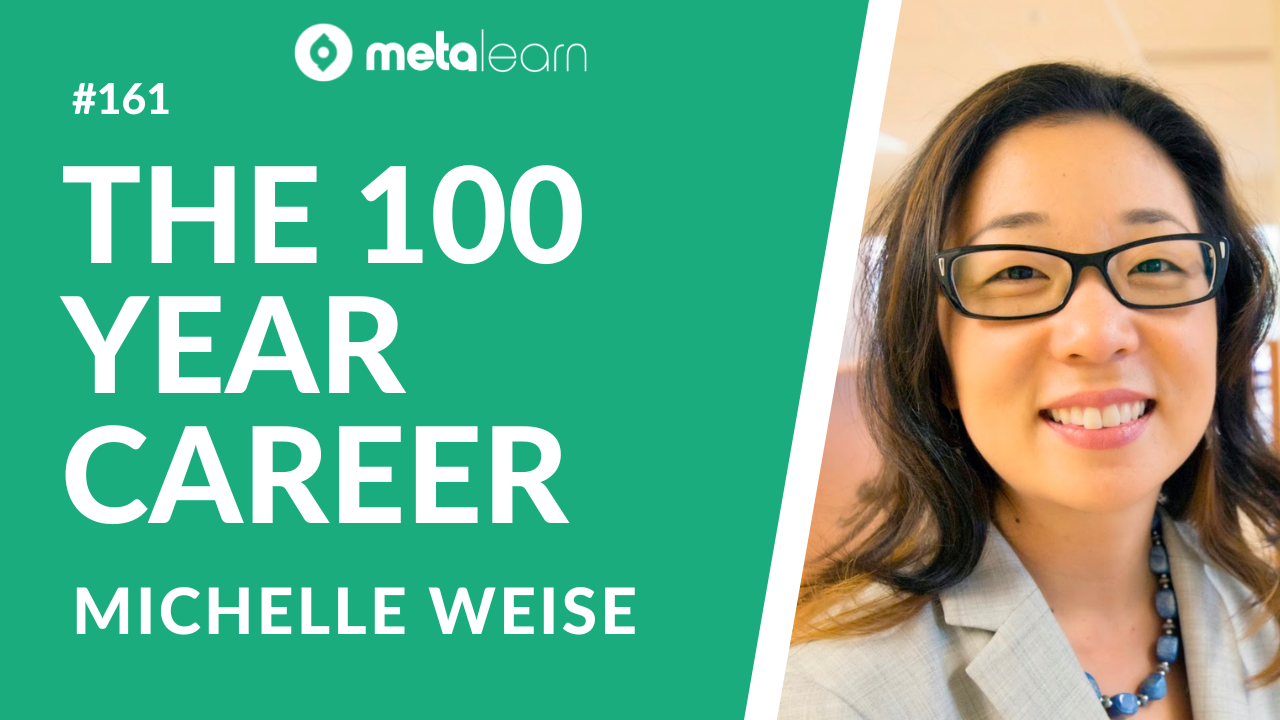ML161: Michelle Weise on The 100 Year Career, Disruptive Education and Preparing for Jobs That Don't Exist Yet
Discover the current state of the landscape in workplace training and higher education, the blend of skills we'll need to develop individually and as a society to thrive in the future and what you can learn from legendary Professor Clayton Christensen.

Michelle Weise is the author of Long-Life Learning: Preparing for Jobs that Don’t Even Exist Yet. She is an entrepreneur-in-residence and senior advisor at Imaginable Futures and her work over the last decade has concentrated on preparing working-age adults for the jobs of today and tomorrow.
Previously she was the chief innovation officer of Strada Education Network and founded Strada Institute for the Future of Work. She also coauthored the book Hire Education: Mastery, Modularization, and the Workforce Revolution with the legendary Professor Clayton Christensen.
Picture a future where careers last 100 years and where education lasts a lifetime. People repeatedly seek out educational opportunities throughout the course of their working lives, which will no longer have a clear beginning, middle, and end. That future is here already.
Michelle's book Long Life Learning which is the main focus of our conversation, paints a clear picture of the world we're moving into, examines the current state of play in higher and workforce education, and explores some of the disruptive innovations that are laying the foundation for a new learning model.
In this episode we discuss:
- The current state of the landscape in workplace training and higher education
- The blend of skills we'll need to develop individually and as a society to thrive in the future
- What Michelle learned from working with legendary Professor Clayton Christensen
If you're interested in the intersection between the future of education and the future of work this conversation will provide a glimpse into the future and leave you with plenty of original insight into how to direct your own career in a rapidly changing environment.
Show Notes
- Introducing Michelle Weise [00:36]
- How did school pave the way for Michelle to pursue a life in academia? [02:18]
- Michelle shares the best teachers she’s had in school and how their way of teaching impacted her. [03:40]
- What is the role of time in workforce education and how has it changed since the pandemic? What is the idea behind time poverty? [06:40]
- How has being good at different languages played out in Michelle’s choice of work? [08:08]
- Growing up in a Korean household that valued education above all, when did Michelle start to differentiate between passion and success? [10:14]
- How did growing up as a Korean American teach Michelle the function of language in translating ideas? [11:42]
- How does the education system succeed and fail at making students aware of their own passions? [13:29]
- What was the problem that inspired the writing of Michelle's book Long Life Learning? [14:25]
- How to make sense of the future of work without being overwhelmed by the thought of automation [17:17]
- How did the pandemic further illuminate the difficulties faced by the labour market? [18:45]
- What are the skills that we need to advance in our careers? How do these skills determine our value relative to machines? [20:29]
- What are the questions we should be asking regarding artificial intelligence and its role in the future of work? [22:14]
- Do we need a more blended vocational and liberal arts education system? How can university avoid sending students into underemployment, or worse, unemployment? [23:27]
- How does developing problem-solving skills better equip learners of any age in the workforce? [25:06]
- Why are employers hiring new talent instead of developing the skills of their current employees? How do management skills play into the ability to upskill? [27:17]
- What are present technologies that can help the workforce identify their competencies and make job seeking easier? [29:33]
- What are the factors that immobilise continuous learning in the workforce? How can we reconcile a market of willing learners with static and conventional learning institutions? [33:02]
- What is one characteristic that can make a company successful in the future? [36:42]
- How can communication help people differentiate themselves in an increasingly competitive labour market? [40:32]
- What are the things that Michelle learned from working with Professor Clayton Christensen? [42:54]
- Closing remarks [46:14]
Resources
Follow Michelle online
- Long Life Learning: Preparing for Jobs that Don't Even Exist Yet by Michelle R. Weise
- Hire Education: Mastery, Modularization, and the Workforce Revolution by Michelle R. Weise and Clayton M. Christensen
- How Will You Measure Your Life? by Clayton M. Christensen, James Allworth, and Karen Dillon
- Graduating and Looking for Your Passion? Just Be Patient by Angela Duckworth

